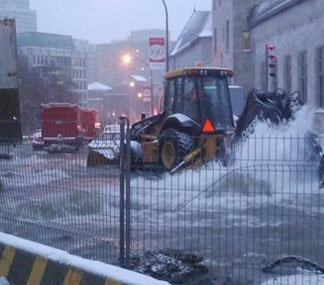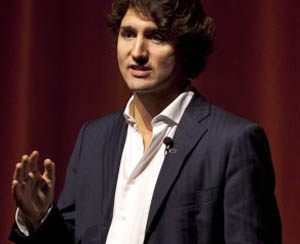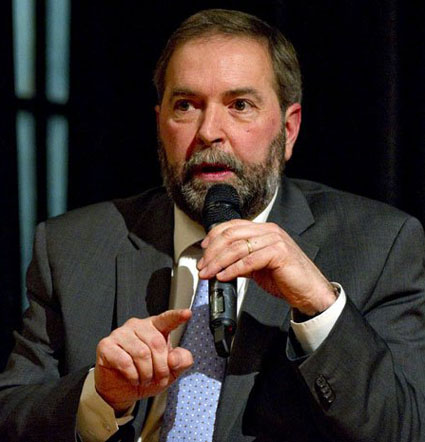Debating conditions for “negotiations on Quebec’s secession from Canada” like rearranging deck chairs on Titanic
Jan 29th, 2013 | By Citizen X | Category: Canadian ProvincesAs the end of the first month of 2013 looms, in the middle of yet another vaguely puzzling Canadian winter, a few less than crucial events have raised the oh-so-boring question of “Quebec independence” yet again. (Last night’s TV news videos of a flooded Sherbrooke Street in Montreal were more interesting than the NDP’s Sherbrooke Declaration, but apparently this real-world miniature disaster was much improved this morning – maybe?)
To start with, today, on her way back from the annual World Economic Forum junket in Switzerland, the leader of Quebec’s current Parti Quebecois minority government, Pauline Marois, stopped off for a chat “with Scotland’s first minister, Alex Salmond, who is pushing his own sovereignty agenda in a referendum scheduled for 2014–an effort that Ms. Marois has said could serve as an example to Quebec.”
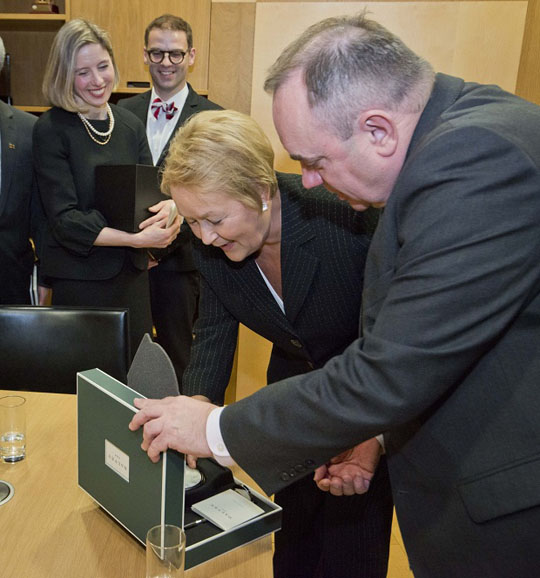
Quebec premier Pauline Marois met Scotland's First Minister Alex Salmond at the Scottish Parliament on January 29, 2013. Photo Credit: Chris Watt, Chris Watt Photography.
The example here may not be all that helpful for the Parti Quebecois : “Support for Scottish independence … hasn’t topped 40 per cent in the last five years.” The “latest poll, released last week, showed support for independence at 28 per cent, with opposition at 48 per cent and almost a quarter of those polled undecided.” The Marois-Salmond tete-a-tete was nonetheless enough for no less an authority than the Wall Street Journal to report: “Quebec Politician Reignites Debate About Sovereignty.”
(On the other side of the street, as it were, when all was said and done : “Quebec Premier Pauline Marois met with Scottish independence leader Alex Salmond today but there was no sighting of the two in public together …Â Salmond’s office downplayed the importance of today’s private meeting, with a spokeswoman describing it as one of ‘’courtesy’ … Two reasons could explain Salmond’s [public] no-show : he may not have wanted to alienate the Government of Canada, and he may not have been eager to be seen in public with the leader of a party that had lost its own independence votes, twice, in 1980 and 1995.”)

NDP MP Craig Scott, who easily held onto Jack Layton’s old seat in Toronto Danforth, in a March 19, 2012 by-election.
Meanwhile, in Ottawa yesterday “New Democrat MP Craig Scott tabled …Â what his party is dubbing the ‘unity bill.’” It specifies “that a bare majority Yes vote would be sufficient to trigger negotiations on Quebec’s secession from Canada.” And it would repeal the somewhat more demanding conditions for such negotiations in “the Clarity Act – introduced by former Liberal prime minister Jean Chretien after Quebecers came within a hair of voting to secede [by a bare majority] in 1995.”
(Well … not exactly to “secede,”many would say. And they weren’t exactly “independence votes” above either. And even the new NDP legislation “would retain the Clarity Act’s insistence on a clear question in any referendum.”)
* * * *
Justin Trudeau, frontrunner in the current federal Liberal party leadership race, has immediately “slammed NDP Leader Thomas Mulcair’s stance on introducing a new bill that would combine the NDP’s Sherbrooke Declaration on sovereignty in Quebec with the Clarity Act …Speaking to reporters in Calgary, Trudeau said, ‘You cannot be half-pregnant on the question of Canadian unity … for me, it’s absolutely unacceptable.’”
You might wonder yourself just why the federal New Democrats have felt obliged to go quite this far right now? One answer is that, yesterday as well, debate began in the Canadian House of Commons on a private member’s bill sponsored by the Bloc Quebecois (the federal analogue of Ms Maurois’s Parti Quebecois in la belle province itself).
This BQ bill “seems designed, in part, to embarrass the NDP, which wrested away most BQ seats in the last election.” It would repeal the old Chretien government’s Clarity Act altogether, since, as urged by current Bloc Leader Daniel Paillé, the nation of the Quebecois which the overwhelming majority in the Canadian House of Commons voted to recognize in late November 2006 (albeit “within a united Canada,” M. Paillé appears to have forgotten) has “the right to decide its own destiny in its own way.”
The good news here, you might say, is of course that neither the NDP’s nor the BQ’s proposed new legislation on what kind of Quebec referendum results “would be sufficient to trigger negotiations on Quebec’s secession from Canada” is ever likely to be passed by the present Canadian parliament.
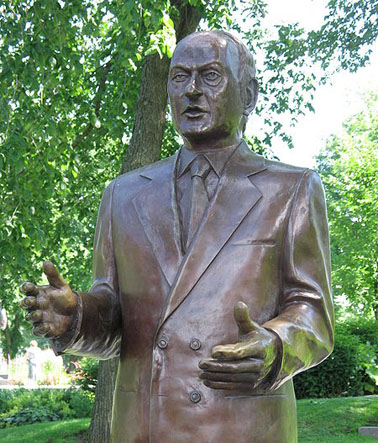
Statue de René Lévesque (1922-1987) devant l'Hôtel du Parlement à Québec. La statue en bronze est l'œuvre du sculpteur Fabien Pagé. Lévesque, fondateur du Parti québécois, a voulu «souveraineté-association» et non «l'indépendance».
(Unless the majority Harper Conservatives suddenly decided, eg, that they wanted to curry the same favour with so-called soft Quebec nationalists that M. Mulcair’s New Democrats still seem to enjoy – which does not appear even remotely possible, even in a world where Canada’s most populous province suddenly has a surprise Lesbian premier?)
As someone outside Quebec who has been watching the Quebec/Canada debate with great interest and I hope at least much due sympathy for more than half a century, I have another kind of reaction. I agree that the practical meaning of the November 2006 resolution on the Quebecois nation in a united Canada requires further attention. But I don’t think this has anything to do with yet another Quebec sovereignty referendum.

Pirelli Calendar Girls in Montreal, 2011. One good answer to the question of why Canada needs Quebec – and vice-versa.
In fact, I very much agree with a related opinion posted on this site more than two years ago – in an article entitled “Gilles Duceppe’s a nice guy – but really out to lunch on what real Quebec independence would mean.” The key point is : “it is now quite clear from much meditation since the 1960s that Quebec as an altogether independent sovereign country in its own right would just destroy Canada as we know it today – geographically and in every other way imaginable.”
To me, in this context, debating the conditions under which “negotiations on Quebec’s secession from Canada” could properly proceed really is just like re-arranging the deck chairs on the sinking Titanic. If something like this ever did actually happen to Canada, the only sensible thing to worry about would be how to get off the ship! (And that, I think, is the bottom line on why so many Canadians outside Quebec have just stopped worrying about Quebec independence.)
